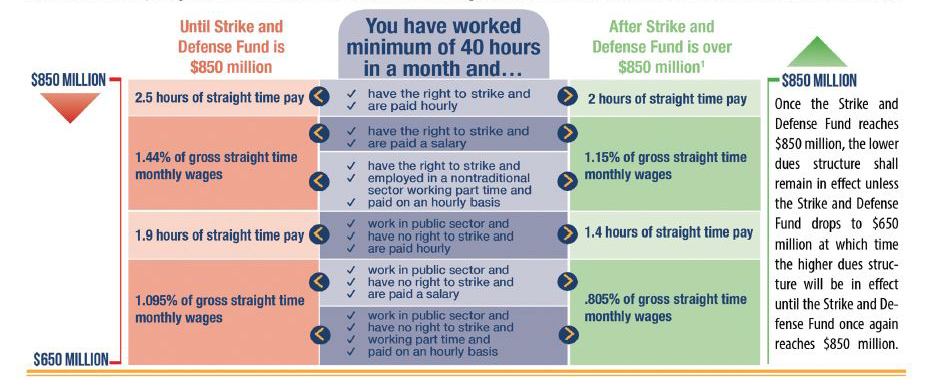Welcome, new UAW members! We are proud to have you in our ranks.
You will find basic information below about how union dues work in the UAW. Remember - membership in our union is about so much more than just paying dues. Dues fund the important work that we do and maintain our union's resources, but it's the active participation of each and every one of our members that makes our union strong!
If you have questions about union dues or are unsure of whether you are currently a member in good standing of your UAW local union, please contact your local union leadership for more information.
How much are UAW member dues?
UAW members pay dues in an amount determined by their pay structure and whether they have a legal right to strike. The UAW dues structure is set by delegates to UAW Constitutional Conventions. The last change to Article 16 occurred at the 37th Constitutional Convention held in June 2018.
See the chart below to better understand how your dues rate is determined.

How are dues used?
All dues collected are portioned out to fund specific efforts of our union, as determined by the UAW Constitution. Dues dollars fund your local union, the general fund of our International Union, and our International Union Strike and Defense Fund.
LOCAL UNION: A large portion of dues is rebated back to the local union. This is used to support member representation and education, as well as fund the many activities of the local within their community.
INTERNATIONAL UNION GENERAL FUND: The International UAW pays for membership education, communication, and organizing – programs geared toward building the union’s strength when it comes to negotiating benchmark pensions and health care benefits, job security provisions, strong health and safety standards, fair work procedures, joint quality programs, and many other important contractual provisions. UAW’s legal, social security, research, and health and safety departments provide expert assistance to help negotiate and enforce collective bargaining agreements.
INTERNATIONAL UNION STRIKE AND DEFENSE FUND: A well-funded Strike and Defense Fund puts employers on notice that UAW members have the resources to strike, if necessary, to win important bargaining demands. It has proven again and again that being prepared to strike can be the most effective way to avoid a strike.
Are UAW dues used for federal candidate campaign contributions?
No. That’s a common misunderstanding. The fact is federal (and many state) election laws prohibit unions from contributing members’ dues money directly to political candidates’ campaign committees. The only money that can be used for contributions to federal candidates is money members voluntarily contribute to V-CAP. If you are interested in learning more about our Community Action Program (CAP) efforts, ask an officer of your local union or get in touch with your local CAP committee.
Will I be affected by the repeal of so-called "right-to-work" laws in Michigan?
Michigan law is changing effective February 13, 2024. After that date, depending on the terms of your collective bargaining agreement, you may be required to pay union dues as a condition of employment. Please talk to your local union leadership for more information.
What else should I know as a new UAW member?
The UAW is a powerful organization with a rich history, and there are endless opportunities to get more involved as an active or retired member. We strongly encourage all members to actively participate in your local union: attend membership meetings and events, vote in union elections, and consider joining a standing committee. For more information about the structure and programs of our union, check out this UAW Basics brochure. We also offer a diverse range of educational opportunities for our members, both in-person and online. Learn more about our member education programs here.
Where can I read the UAW Constitution?
You can find the UAW Constitution in its entirety here.
Where can I find out more?
Talk to your local union leadership! Your president, financial secretary, or any other officer of your local union can assist you with understanding our dues structure. They can also provide more information about opportunities to get involved with our union.
